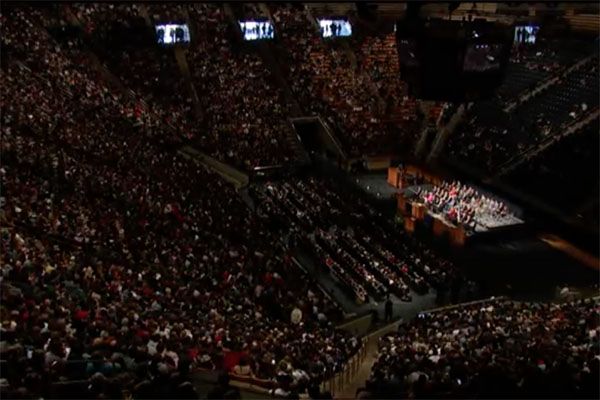BYU Speeches Hall of Fame
December 2, 2016 • Blog Post
BYU has hosted some pretty big names as forum and commencement speakers over the years. We’ve gathered some of the best forum addresses from world-renowned directors to political leaders to modern-day heroes. We should note that we don’t always receive permission to publish forum addresses, so some of your favorites may be missing from this list.

Cecil B. DeMille, Hollywood Director and Producer
May 31, 1957
“We are too inclined to think of law as something merely restrictive—something hemming us in. We sometimes think of law as the opposite of liberty. But that is a false conception. That is not the way that God’s inspired prophets and lawgivers looked upon the law. Law has a twofold purpose. It is meant to govern and it is also meant to educate.”
Paul Rusesabagina, Rwandan hotel manager who hid more than 1,200 refugees
January 29, 2008
“Words can be the best or the worst weapon in the human being’s arsenal, depending on what goal you want to achieve. The only thing that can bring people together is dialogue.”
Mitt Romney, former Republican nominee for president
November 18, 2014
“America needs heroes. You don’t have to be larger than life to be a hero, just larger than yourself. We see heroes every day—Scoutmasters, Primary teachers, missionaries, campaign volunteers, parents. I hope you will choose to be a hero, because this world needs a lot more of them.”
Arun Gandhi, grandson of Mohandas Gandhi and activist
March 23, 1999
“It’s not just the wars that we need to be concerned about. Our loss of humanity is also a matter of great concern. We are becoming so immune to violence that we don’t care what happens to people, and this kind of a spiritual death is more dangerous than all the violence we see around us.
“We don’t want to make the 21st century more violent than the 20th century. We want to reverse the course and make it less violent so we can all live in peace and harmony. And we can do this. We can achieve peace if we are determined to make the effort.”
[for a partial transcript, see BYU Magazine’s article: https://magazine.byu.edu/article/reflections-of-peace/. This text is copyrighted by Arun Gandhi.]
David McCullough, Pulitzer Prize–winning author
September 27, 2005
“Very often we are taught history as if it were predetermined, and if that way of teaching begins early enough and is sustained through our education, we begin to think that it had to have happened as it did. We think that there had to have been a Revolutionary War, that there had to have been a Declaration of Independence, that there had to have been a Constitution, but never was that so. In history, chance plays a part again and again. Character counts over and over. Personality is often the determining factor in why things turn out the way they do.”
Joseph Lieberman, former U.S. Senator
October 25, 2011
“Our Founders were overwhelmingly men of the same Christian faith, yet the founding documents they bequeathed us guarantee religious freedom, including the right of every American to hold elective office regardless of his or her religion. Article VI of our great Constitution explicitly bans religious tests for elective officials, and the First Amendment prohibits the establishment of an official religion, ensuring for every American the right to worship—or not to worship—as he or she so chooses. The full promise of this founding vision, I believe, is one of freedom of religion, not freedom from religion.”
Read summaries from other forum speakers at BYU Magazine:
Ken Burns, documentary filmmaker
March 27, 2007
Condoleezza Rice, former secretary of state
January 13, 2011
Elie Wiesel, Holocaust survivor
January 22, 1985




